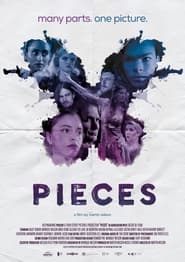The strongest element of Pieces is that it is relatively adventurous in form, fusing conventional narrative storytelling and non-linear elements with a pseudo-documentary style which felt distinct from scripted fly-on-the-wall shows. Yet what this framing device actually adds to the experience of watching this film remains unclear to me, beyond a certain confusion that—contrary to the director's stated intentions—did not evoke a sense of living with a mental health condition. In aggregate, it actually felt like it prevented me from understanding the characters as it prevented me from imagining that characters were, in fact, 'real', as the cutting from within the simulated documentary and the regular narrative constantly reminded me that this was an entirely fictional piece of work, and ultimately prevented forging an authentic emotional connection to them.
The weakest part, however, is that characters feel like exaggerated and mawkish caricatures of people who would be attending the class, and even the military-coded opponent of the class felt like an unhelpful cartoon sendup of toxic masculinity or an over-the-top gangster from a Guy Ritchie movie. Its rather melodramatic depictions of suicide ideation (e.g. grabbing a knife and holding it to your own throat on some small provocation) felt highly contrived and theatrical as well. Surely nobody actually does that?
In that sense, this movie ultimately did not challenge me to re-evaluate any preconceived ideas about mental health. The cinematography may be easy on the eye, but many of the 'artistic' shots seem decidedly out of place. For example, there are a number of unfeeling top-down drone shots which actually conjure up themes of state surveillance in a thriller movie, such as in the opening title sequence of David Fincher's Panic Room. But this admittedly great-looking shot is inappropriately used for a sub-plot in which a character is attempting suicide by the railway tracks and another character is rushing trying to prevent them! There are a number of other 'hero' moments of camerawork as well, particularly in the montage sequence in the final act. Yet they appear to be chosen for their flair and artistic qualities alone; perhaps a marker of the director's work in the aesthetically snappier world of advertising.
The film carries a clear commitment to asking us to reevaluate outdated stereotypes of mental health, and the soundtrack militates against a sentimental reading of the screenplay. Yet the film ultimately remains too obvious and simplistic (such as the overly-heavy symbolism of kintsugi pottery repaired with gold) to be effective.

